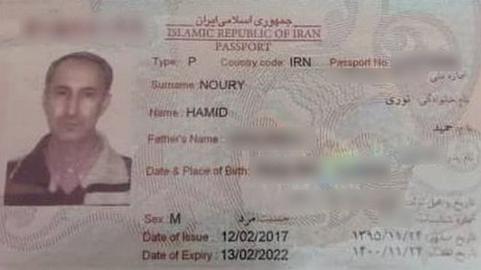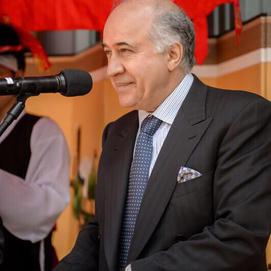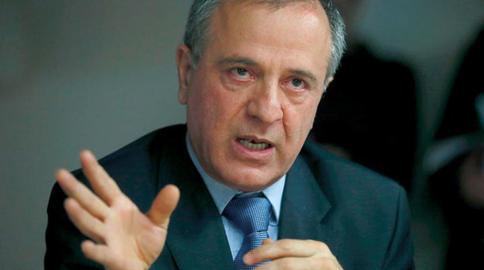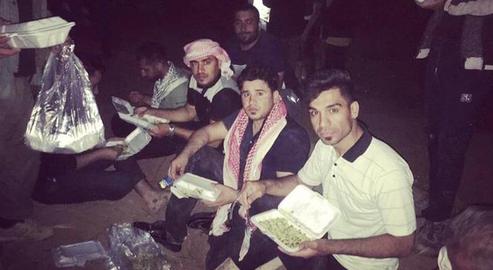Swedish authorities have jailed an Iranian prosecutor alleged to have played a role in the mass executions of prisoners in 1988 — one of the most shocking events in the history of the Islamic Republic.
Almost anybody who served time at Gohardasht Prison, also known as Rajaei Shahr, in the 1980s is familiar with Hamid Nouri, a pseudonym for Hamid Abbasi, who was an assistant prosecutor for the prison at the time.
According to testimonies from former Rajaei Shahr inmates, during the 1980s Nouri served on the prison’s “death panel” that decided which political prisoners were to be executed and when. “There were assistant prosecutors like Hamid Abbasi who testified before the committee,” writes Iraj Mesdaghi, a former political prisoner who has written extensively about Iranian political prisoners in the 1980s. “They were people who added fuel to the fire and tried to bring the panel to a consensus over the decision to execute.”
On November 13, Swedish authorities arrested Hamid Nouri in Stockholm by order of a Swedish court after a private plaintiff, Kaveh Mousavi, brought a case against him. Mousavi, a lawyer and arbitrator for the International Court of Arbitration, is also an Associate Research Fellow at Oxford University in the United Kingdom. Nouri has been charged with five counts, all of which are related to the 1980s massacre of political prisoners in Iran.
In 1988, toward the end of the Iran-Iraq War, Supreme Leader Ayatollah Ruhollah Khomeini ordered the secret mass execution of thousands of Iranian political prisoners. Most were leftists, and many were members of the People’s Mojahedin Organization (MEK), which had sided with Saddam Hussein’s Iraq during the war. Acting on Khomeini’s behalf, a small group of high-ranking officials went into Iranian prisons and questioned prisoners — most of whom the judiciary had already sentenced to prison terms — about their religious and political affiliations. Those deemed unlikely to recommit themselves to Islam and Khomeini were sent in groups to be executed by hanging, and were then buried in secret.
The victims were buried in mass graves. Their families were not only not allowed to bury their loved ones, they were not informed of exactly where they had been buried.
Based on evidence and documents provided by Iraj Mesdaghi, the court in Stockholm has extended Nouri’s detention for four more weeks so that eyewitnesses can testify at the court.
“For months I kept his movements under surveillance,” Iraj Mesdaghi told IranWire. “He had traveled to Germany many times and this time he wanted to travel to Italy on a one-year visa. We had been planning for this for a long time and several lawyers in the UK, Germany and Sweden were kept informed. With the cooperation of Mr. Mousavi and the warrant from the Swedish prosecutor, he was arrested the moment he landed at Stockholm Arlanda Airport. We had enough evidence and documents to convince the Swedish judiciary and the prosecutor.”
Choosing Who Dies and Who Lives
Iraj Mesdaghi was not at the airport when Nouri was arrested, but he followed events as they unfolded and rushed to the court once Nouri was in custody. “It was a very important moment for us because he and others, like Mohammad Moghiseh, who was known in prison as ‘Naserian,’ played central roles in planning for the 1988 massacre. He was instrumental and serious in selecting the prisoners and prioritizing who appeared before the death panel. The judges in the death panel, of course, were not closely familiar with the prisoners, so this gentleman and Naserian presented the necessary justifications to the panel to convince them that the prisoners they had selected must be executed.”
“Hamid Nouri read the names of the prisoners and lined them up,” Mesdaghi remembers. “He then asked the guards to take them to their ward but the word ‘ward’ was actually code word for them to take the prisoner to the gallows. I myself had witnessed him many times in prison.”
Later, following up on Nouri, Iraj Mesdaghi found out that he was still active in Iranian political life and worked for the intelligence ministry. “He has close relations with [current head of the judiciary] Ebrahim Raeesi, [former intelligence minister] Ali Fallahian, [former justice minister] Mostafa Pourmohammadi and Judge Moghiseh and worked with the intelligence Ministry under the assumed names of Vahid and Abdollah.” Raeesi sat on the so-called death committee set up by Ayatollah Khomeini.
Mesdaghi was in court when the charges against Nouri were read but, under Swedish law, he was required to leave the courtroom when the charges were discussed in the presence of the prosecutor and his assistants. He was again present in court when the judge prepared to take the decision to extend Nouri’s arrest for another four weeks.
Isn’t Mesdaghi worried that the Iranian government will interfere and try to secure the freedom of the defendant, I asked? “Sweden has one of the highest standards of justice and has the necessary experience in handling cases like this,” said Mesdaghi. “Our evidence is very comprehensive and convincing.”
Kaveh Mousavi told IranWire that he had lodged the case against Nouri in memory of those who unjustly lost their lives in the 1980s.
Mousavi and his team led by Iraj Mesdaghi had expected Nouri to be arrested in Germany and had prepared everything for such an eventuality. But on the morning of November 9, Mesdaghi’s sources informed him that Nouri had suddenly changed his itinerary and was flying to Sweden. “After Mr. Hamid Nouri’s travel plans changed I had a limited time — only six hours on a weekend — to convince the Swedish prosecutor to arrest him,” Mousavi told me.
Mousavi said he had the help of a team of 18 lawyers. “Considering that in Sweden the assumption is that people are innocent until proven otherwise, I had told Mr. Mesdaghi to gather enough convincing evidence for his arrest and we succeeded in doing so,” he said.
Time Cannot Bury Crimes Against Humanity
Mousavi said crimes such as the 1988 mass executions are so extreme that they are not subject to the statute of limitations, which allows for events to be exempt from legal proceedings beyond a certain time. “Such crimes have a public aspect, meaning that they are not crimes against an individual but are considered crimes against humanity and can be prosecuted anywhere in the world. They are subject to judicial prosecution wherever humans live. War crimes, genocide and torture are among such crimes and are not subject to the statute of limitations. As a human being, as an Iranian and as a lawyer, I have always felt unhappy that those who were executed in the 1980s never received the due process of law and an impartial judgment.”
“The evidence was sent and I prepared my complaint,” Mousavi told me. “Now that we have reached this point I no longer insist to remain as a private plaintiff because many have announced that they want to join the suit or want to testify. Based on Swedish laws, I can either remain as a private plaintiff or leave the suit, in which case the Swedish government itself would follow the matter.”
The mass execution of political prisoners started after Operation Mersad, the last major military operation of the Iran-Iraq war in July 1988, which was a major victory for Iran. According to Mousavi, Nouri has now been charged with war crimes for his participation in the executions. “Many young prisoners who had no record of armed activities, who just supported a political movement and who were serving their prison sentences were executed en masse after this military operation that had nothing to do with them,” he says. “Even a prisoner of war has rights and must not be put to death, let alone somebody who was never involved in the war.”
Mousavi says that the Iranian embassy has hired expensive lawyers to defend Nouri. “We have gathered enough evidence so that they cannot get him off through legal maneuvers and by resorting to the statute of limitations,” Mousavi said. One charge Mousavi brought against Nouri was “making individuals disappear,” and he has argued that until the bodies of the missing individuals are found and identified by their families this charge remains valid and the defense of statute of limitations cannot apply. Even after so many years, the families of many victims of the 1988 massacre have yet to know how they died or where they have been buried.
Mousavi says that he is “101 percent” confident that Nouri will not be released by Sweden’s justice system.
Related Coverage:
Iran's Leader Appoints a Criminal as Head of Judiciary, March 6, 2019
Iran’s Blood-Soaked Secrets, December 4, 2018
Iran Destroying Graves from 1988 Executions, April 30, 2018
1988: The Crime that Won't Go Away, August 3, 2017
My Father, the 1988 Massacre and the Need for Truth, April 5, 2017
“The Skeletons in These Graves Could Change the Future”, October 27, 2016
Political Prisoner: "Iran Must Investigate 1988 Executions", October 19, 2016
Iran Still Haunted by its “Biggest Crime”: the 1988 Prison Massacre, September 15, 2016
Montazeri and the 1988 Massacre of Prisoners, August 12, 2016
visit the accountability section
In this section of Iran Wire, you can contact the officials and launch your campaign for various problems




























comments